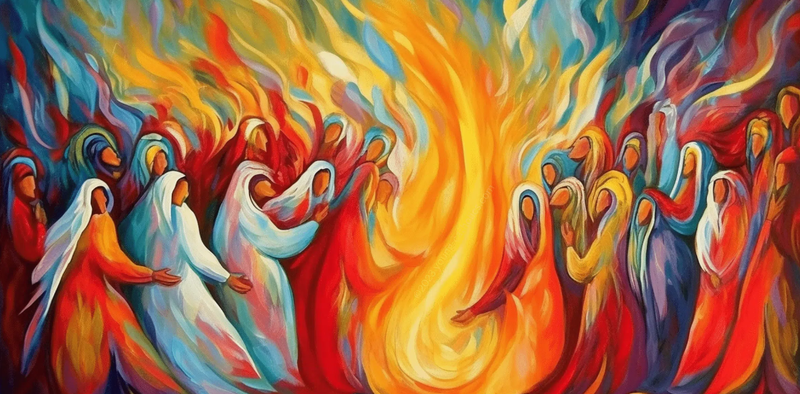National Reconciliation and the Coming of the Spirit
This year Pentecost and National Reconciliation Week coincided with Pentecost Sunday being the 28 May and National Reconciliation Week beginning the day before. As Catholics Pentecost is a time when we celebrate the coming of the Holy Spirit and reflect on ways the Spirit can work in the world today. The theme for National Reconciliation Week this year is ‘Be A Voice For Generations’. The theme encourages all Australians to be a voice for reconciliation in tangible ways in our everyday lives – where we live, work, and socialise. The Catholic Church has long advocated for and supported Reconciliation in Australia between Aboriginal and non-Aboriginal people. It occurs to me that this coinciding of important events is worth some reflection.

At the Mass on this Solemnity of Pentecost celebrated in Saint Peter’s Basilica, Pope Francis in his homily called on Catholics to “invoke the Spirit daily upon our whole world!” He also explained how the Spirit “restores harmony in the heart…to forgive sins, to reconcile minds and to harmonize hearts wounded by evil, broken by hurts, led astray by feelings of guilt.” The Pope said it would be good to examine our own lives and ask if we are open to the harmony of the Spirit, or if we resist being transformed by sticking to our own pursuits and ideas. Are we quick to judge others, overlooking our own weaknesses, he asked, and do we try to foster reconciliation and build communion? As Catholic Australians we must work towards harmony in terms of reconciliation and become in touch with the harmony of the Spirit. It is time we examine our nation, its history, and the need for healing.
These are not just my personal views but that of Catholic social justice teaching informed by the sacred texts and a long tradition of Papal leadership. Catholic social teaching says that the life and dignity of indigenous peoples should always be protected in the same way that the life and dignity of every human being should be protected. In the past and even now in the present this has not been the case. Pope John Paul II recognised and addressed this issue when he visited Alice Springs in 1986. He also wrote in his exhortation Ecclesia Oceania published in 2001, “Whenever the truth has been suppressed by governments and their agencies or even by Christian communities, the wrongs done to the indigenous peoples need to be honestly acknowledged….The past cannot be undone, but honest recognition of past injustices can lead to measures and attitudes which will help to rectify the damaging effects for both the indigenous community and the wider society. The Church expresses deep regret and asks forgiveness where her children have been or still are party to these wrongs. Aware of the shameful injustices done to indigenous peoples in Oceania, the Synod Fathers apologized unreservedly for the part played in these by members of the Church, especially where children were forcibly separated from their families.” (Ecclesia in Oceania, 28).
In relation to recent developments in the process of reconciliation in Australia the Catholic Church has supported the Uluru Statement of the Heart as have many other Christian and non-Christian churches or religions. Earlier this year the Catholic Church joined other churches and religious organisations signing an open letter calling on parliamentarians “to find ways to collaborate constructively across political divides” to support the Indigenous Voice to parliament as “Future generations of Australians will not forgive us if we fail to grasp the historical moment, and ‘advance Australia’ further along the path of justice.” The letter was signed by Catholic, Uniting and Anglican churches, the Australian National Council of Imams and the Executive Council of Australian Jewry.
This week many will pray for harmony of the Spirit and for Reconciliation in Australia. Below is an extract from Fr Frank Brennan’s Pentecost Homily on the 28 May 2023.
“Let’s hope the reconciling Spirit blows through the chambers of our Parliament during the next three weeks while our elected leaders lay the groundwork for the three month campaign when we the people must decide how we are to be reconciled in this land, deeply listening to each other’s concerns for those who are the First Peoples of this land and for all those who come to this land to find a home where they can live in peace and security, equal under the law.
Come, Holy Spirit, come!
On our dryness pour your dew;
Wash the stains of guilt away:
Bend the stubborn heart and will;
Melt the frozen, warm the chill;
Guide the steps that go astray.
Come, Holy Spirit, come!”
Louise Barry - Religious Studies Coordinator